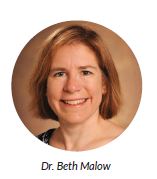One doctor’s quest to help families rest.
Before Dr. Beth Ann Malow attained her distinguished roles at Vanderbilt University as the Chief of their Division of Sleep Disorders, as well as the Burry Chair of Cognitive Child Development, she was a neurologist with an interest in sleep medicine. A twist of fate—motherhood—focused her interest toward helping children with autism thrive through better quality sleep.

Dr. Malow’s personal experience raising two children with Autism Spectrum Disorder (ASD) introduced her to a community of parent-advocates who were struggling with a myriad of sleep issues. In fact, Dr. Malow says 50-80 percent of parents report sleep-related issues in their children with ASD, from insomnia to daytime sleepiness. Dr. Malow found that the more disrupted the sleep of the ASD patient, the more often the parents were exhausted and overwhelmed, and struggled in the daily care of their child.
QUESTIONS ABOUT AUTISM
Dr. Malow explains that ASD is a neurological disorder that affects social interactions and communication skills, but these patients can have multiple conditions at the same time. Known as comorbidities, conditions that often appear alongside ASD include epilepsy, GI issues, ADHD, obesity, anxiety and sleep disorders.
One question that still has not been fully answered is whether the sleep issues cause—or are caused by— the comorbidities. For example, is anxiety or digestive distress an instigator of insomnia? Or is insomnia preventing the brain from “resetting” and stirring up anxiety and GI issues? Is epilepsy a consequence of inadequate restorative sleep, or is epilepsy the root cause? Dr. Malow acknowledges that “it is a very exciting time in the field,” as research continues into the complex interconnectedness between neurology and the body.
FINDING ANSWERS
The good news, according to Dr. Malow, is that “many sleep disorders are highly treatable,” and often have a domino effect in other areas of concern. For example, Dr. Malow and her colleagues have found success by treating obstructive sleep apnea (OSA) in children with epilepsy. “Once patients are sleeping better, they often need less seizure medicine, and the medicine seems to work better,” says Dr. Malow, “and they see less daytime sleepiness.” Being more alert throughout the day primes these kids for better learning.
A benefit to treating sleep disorders is that patients get more out of behavioral therapy or other interventions when they show up for these sessions well-rested and more agreeable.
Dr. Malow found that when kids slept better, parents and families slept better. “When parents are more well rested, they can be a better advocate. They have more patience. And they find they can interact with their children more effectively,” asserts Dr. Malow.
INDIVIDUALIZED SOLUTIONS
Just as each patient is unique, there is no one-size-fits-all solution for sleep. Dr. Malow says a sleep specialist can help with any underlying medical disorders, such as OSA. Another helpful resource, Dr. Malow says, is having behavioral specialists who can assist by identifying daytime habits, changes to bedtime routines, or sensory related disruptions that address very specific concerns and individual situations.
GETTING THE WORD OUT
Not all primary care physicians have the time or expertise to address sleep concerns in their ASD patients, but Dr. Malow says treating sleep disturbances is a “pivotal part of the intervention for autism.” In order to help more parents, Dr. Malow co-authored a book with Dr. Terry Katz called Solving Sleep Problems in Children with ASD. Additionally, her team has also created a sleep tool kit that can be downloaded free of charge (vumc.org/sleepinautism).
After years of seeing dramatic improvements in her ASD patients’ lives after effective sleep interventions, Dr. Malow is now expanding her research to include other disabilities in children as well as teens and adults in her expanded role as director of the Vanderbilt Kennedy Center Clinical Translational Core. One of the most gratifying aspects of her work is hearing the happy feedback from parents when their child is sleeping better, and the positive impact of that on other areas of their lives.
………………………………………………………………………….
Shanti Argue is a freelance writer who loves researching and writing about a variety of topics.



